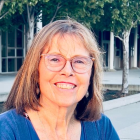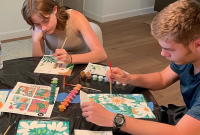Support strong Canadian climate journalism for 2025
These in-their-own-words pieces are told to Patricia Lane and co-edited with input from the interviewee for the purpose of brevity.
Wondering what happened to the leaders of the 2019 climate student strikes? Meet Shir Gruber. Now a Masters student at McGill University, Shir helped organize 500,000 people to take to the streets of Montreal (Tiohtià:ke) and call for more action on climate justice. Then, the COVID-19 pandemic hit and she really got busy.
Tell us what you have been doing since March 2020.
In 2019, I was in CEGEP and co-president of Dawson College’s environmental club. Stakeholder engagement combined with community-led scientific research led to the installation of composting facilities for all 10,000 students.
I joined Sustainable Youth Canada/Écosystème Jeunesse Canada (SYC). We learned about a green space near Montreal, Angell Woods, with wetlands and old-growth forest that had been a dumping ground, but the local youth were trying to clean it up. SYC’s “Project Phoenix” added capacity to their efforts. Youth community members identified a particularly polluted area of the park. Together, we assessed the extent of the problem, engaged the broader community, cleaned, sorted and catalogued the origins of the trash, ran scientific tests on the soil, analyzed the growth of invasive species through satellite imagery and reported findings to the municipal government. Collectively, SYC and the community removed 50,000 pounds of oil cans, discarded car parts, steel ties, cement, chemical waste containers and other debris. We hope our report will inform the creation of a large municipal park. Our primary recommendation is multi-generational and diverse collaboration leaves everyone better off.
At a SYC sustainable fashion show fundraiser, we displayed a sculpture made from large pieces of trash we cleaned up, raised money for a local women’s shelter, hosted a clothing swap and premiered our team’s podcast about the circular economy.
Since all of Project Phoenix was outside, we could make it happen during the pandemic.
Project Phoenix is an example of SYC’s work at the grassroots. We also persuade top decision-makers to implement youth priorities. We are part of a coalition calling for a Youth Climate Corps to allow young people to build municipal capacity and are pleased that mention of it was included in the 2024 federal budget. You can find and sign our open letter here.
SYC participates in consultations with the Canadian government, advocating for stronger support of youth climate action such as the consultation about Canada's National Adaptation Strategy and the right to a healthy environment under the Canadian Environmental Protection Act. As a member of the Natural Resources Canada's youth council, I was privileged to hear and amplify perspectives of diverse youth and stakeholders.
SYC has chapters across the country. Everyone is a volunteer, so we support each other in starting up and running chapters, sharing resources and learning and engaging in national challenges and opportunities. We seek mentorship and financial support to create permanent positions to support this growing movement.
We are starting to hear talk of more student strikes in the fall. We will see. In the meantime, many students left climate-striking inspired but without a clear sense of what to do next, while many who worked in the day-to-day tasks of conservation and caring at the grassroots need community support. We have learned how to bridge some of those gaps.

How did you get into this work?
I was raised in a family that was committed to caring for the Earth, its waters and each other. It is no accident that I am a hydrologist. I worked as a lifeguard and, as I learned more about the science of climate change, I became concerned about the future of these tiny children in my care, as well as my younger cousins and little brother. The joy of working with others to create tangible solutions keeps me going.
What makes it hard?
The systems that shape how we live must be reshaped, but they are complex and have deep historical roots. Canada’s economy and our national values were shaped by a colonial extractivist ethos. Many people’s jobs and communities still depend on that way of life. We need to shift how we see and approach the world. How do we engage people inclusively and change fast enough to leave the planet habitable?
What gives you hope?
The solutions we design are imperfect. Making them better creates community. Community is how we will thrive. There is a need for everyone’s skill set in this iterative process.
What is your vision?
Decision-makers are guided by long-term thinking. We have intergenerational accountability.
What would you like to say to other young people?
The beauty of community is that the world is not all on your shoulders. Engage where your interest lies. If you are working on affordable housing, you are contributing to mitigating the impacts of the climate crisis that intersect with clean energy and public health. It all matters and interconnects. Look around to see if there is an existing group that is pointed in the same direction and could use your passion. Lead with empathy and love.
What about older readers?
Thank you for paving the way. Now, please, we need you to mentor and support us.







Comments